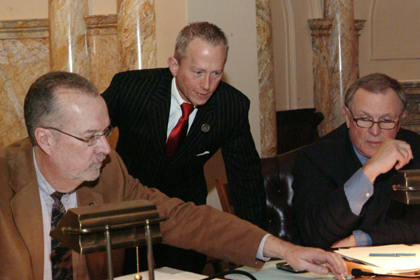
TRENTON – Legislation sponsored by Senator Jim Whelan, Senator Jeff Van Drew and Senator Christopher J. Connors that would limit the application of Department of Environmental Protection shellfish habitat rules for dredging activities in order to maintain commercial and recreational activities at existing facilities is now law.
“The DEP’s rules create too much bureaucratic tape for existing marinas, and this is having an adverse economic impact on our local fishing industry,” said Senator Whelan (D-Atlantic). “In an effort to keep the industry and our local economy alive, loosening the burdensome DEP rules regarding dredging will have a significant impact. Providing improved access to the waterways is critical to small marinas in our region that are trying to remain afloat, as well as to fishermen and shellfish harvesters whose businesses are vital to our economy. This law will also provide homeowners who live along the coastline with the ability to access our waterways and enjoy all they have to offer.”
“We have to strike a balance between protecting our environment and allowing our existing fishing industry to continue to thrive,” said Senator Van Drew (D-Atlantic, Cape May, Cumberland). “Loosening some of the strictest rules will promote the economic activity to this region of our state while ensuring that the shellfish habitat is protected.”
“The intent of this bipartisan initiative is to provide regulatory relief so that marinas can dredge areas essential to their operations,” said Senator Connors (R-Atlantic, Burlington and Ocean). “The exemptions provided under the new law are practical, necessary and should prove beneficial to the economic base in coastal areas.”
Under the law, S-2369, the DEP would exempt from the shellfish habitat rule dredging projects:
- involving the established footprint of a functioning marina in operation on the date of enactment of this bill into law or the footprint of a marina that was in operation up to 10 years prior to the date of enactment of this bill into law;
- along a 75-foot-wide direct channel between the existing, functioning marina and its docks and the closest State or federal navigation channel serving the locality for the marina;
- within 250 feet of a vertical timber or other material bulkhead supporting an upland development with a water dependent use, or that had a water dependent use up to 10 years prior to the date of enactment of this bill into law; or
- within 250 feet of the mean high water line adjacent to an upland development with a water dependent use or that had a water dependent use up to 10 years prior to the date of enactment of this bill into law.
Under the exemption, a person would be limited to dredging the area of the bay floor that is essential to the water dependent use of the upland development. Water dependent use, as defined in the law, means development that cannot physically function without direct access to the body of water along which it is located. The law would not apply to new development or to an expansion of any water dependent use at the existing development.
A person dredging as allowed under the law would have to obtain all other permits and approvals for the dredging as may be required pursuant to State or federal law, rule, or regulation, or local ordinance.
The Senate approved the bill with a vote of 36-0. The Assembly approved it 76-0. The governor signed it into law yesterday. It takes effect immediately.

